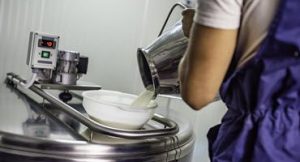
I thought it would be a good idea to talk about some of the things we hear and to provide the correct information as we know it.
I want to preface the discussion by stating that I am grateful that people do contact me to ask questions about what they have heard.
Where is Your Milk Being Processed?
Recently, I was told that Walmart is destroying the Pennsylvania dairy industry because the stores are bringing in milk from Walmart’s Indiana processing plant.
There may be some Indiana milk going into Walmart stores in Pennsylvania, but I can also state with certainty that there is a lot of Pennsylvania-produced and -processed milk in Walmart’s stores. Just because the cartons have a store-brand label does not mean they are processed in a store-owned plant.
You can easily check where milk comes from — state and actual plant location — by looking at the plant code that will be somewhere on the carton. Each state is given a two-digit code followed by a dash and another number (one to five digits).
Pennsylvania’s state code is 42. If you see the code 42-136 on the carton, that milk was processed at Harrisburg Dairies. A code of 42-146 indicates the milk was processed at United Dairies in Uniontown.
Any plant location can be identified through the website whereismymilkfrom.com. Just enter in the plant code from a carton of milk to find where that milk was processed.
I have been sharing for some time that 60% to 70% of Pennsylvania-produced milk goes out of the state for processing or sales.
There is a myth that this milk is being replaced (or pushed out) by milk coming into the state due to our higher wholesale and retail prices.
Milk is leaving the state because Pennsylvania produces more milk than our state consumers will buy.
That is not a bad thing, and many of our small farms are kept in business because our state’s processors buy their milk and continuously look for new markets.
Over-Order Premiums
Most of the conversations on this topic are centered on the over-order premium, which I have written about a lot lately. This article is not about OOP, so I won’t add comments about it other than to reinforce that the board and its staff are very much aware of the issues and are working to find a way to address them to help our producers.
I wrote a column once that stated I often feel like King Solomon when asked to provide opinions or make decisions when our various stakeholders may be at odds with one another.
I feel that way when a producer tells me he/she feels the cooperatives are trying to take over the entire state and want to put our independent processors out of business.
The board, its staff and I need to have positive, productive working relationships with all our constituent groups and, as best as we can, we must remain apolitical in situations in which any of the groups have disagreements.
What I can state about that situation is that we are all about preserving the ongoing viability of Pennsylvania’s dairy industry. We recognize the contributions of all groups with which we work. We value and appreciate all our producers — large and small — and want to do our part to maintain the business health of our independent processors.
However, we also recognize that our cooperatives provide markets for many producers who would not have one otherwise and have played a valuable role in the economics of our dairy industry.
On Minimum Wholesale Prices
One more rumor has its basis in something written in the law.
The Milk Marketing Law requires that board-established minimum wholesale prices include a 2½ to 3½ rate of return to dealers. Many people would assume, then, that processors make that much profit.
Our records indicate that most of our fluid milk processors do not make that much profit and rely on the diversification of their businesses to cover any shortages in the dairy end of their businesses.
The bottom line is this. Please contact me when you hear something that seems outrageous, confusing or doesn’t make sense, or with any other question or concern you may have.
I or another staff member will respond with the facts and provide you with other resources if needed. I can be reached at 717-210-8244 and by email at chardbarge@pa.gov.























